Book5Unit1Greatscientists持续性评价设计及检验提示单
- 格式:docx
- 大小:9.49 KB
- 文档页数:2
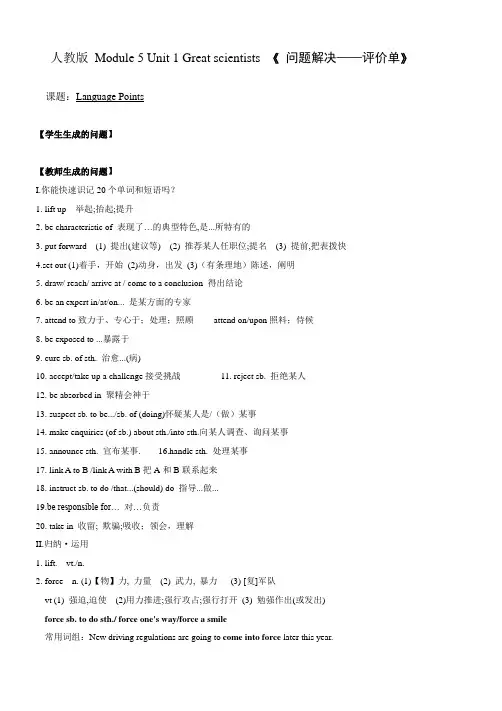
人教版Module 5 Unit 1 Great scientists《问题解决——评价单》课题:Language Points【学生生成的问题】【教师生成的问题】I.你能快速识记20个单词和短语吗?1. lift up 举起;抬起;提升2. be characteristic of 表现了…的典型特色,是...所特有的3. put forward (1) 提出(建议等) (2) 推荐某人任职位;提名(3) 提前,把表拨快4.set out (1)着手,开始(2)动身,出发(3)(有条理地)陈述,阐明5. draw/ reach/ arrive at / come to a conclusion 得出结论6. be an expert in/at/on... 是某方面的专家7. attend to致力于、专心于;处理;照顾attend on/upon照料;侍候8. be exposed to ...暴露于9. cure sb. of sth. 治愈...(病)10. accept/take up a challenge接受挑战11. reject sb. 拒绝某人12. be absorbed in 聚精会神于13. suspect sb. to be.../sb. of (doing)怀疑某人是/(做)某事14. make enquiries (of sb.) about sth./into sth.向某人调查、询问某事15. announce sth. 宣布某事. 16.handle sth. 处理某事17. link A to B /link A with B把A和B联系起来18. instruct sb. to do /that...(should) do 指导...做...19.be responsible for… 对…负责20. take in 收留; 欺骗;吸收;领会,理解II.归纳·运用1. lift. vt./n.2. force n. (1)【物】力, 力量(2) 武力, 暴力(3) [复]军队vt (1) 强迫,迫使(2)用力推进;强行攻占;强行打开(3) 勉强作出(或发出)force sb. to do sth./ force one's way/force a smile常用词组:New driving regulations are going to come into force later this year.Peace cannot be imposed(强加) by force .I get up at 6 o'clock every day by /through/out of/from force of habit.3. characteristic n.特点,特征;特性characteristic adj. 典型的,独特地be characteristic of 表现了…的典型特色,是...所特有的characteristically adv.character n. UN (人的)品质;性格;(事物的)性质;特性character trainingCN (小说、戏剧等的)人物,角色;(书写或印刷)符号;(汉)字;字体Chinese characters4. put forward (1) 提出(建议等) (raise/come up with)(2) 推荐某人任职位;提名May I put your name forward as/for our monitor?(3) 提前,把表拨快■归纳put的常用词组:put aside节省(钱、时间);储蓄;把…放在一边put away储存(钱);收拾起来put sth into action/effect/force/practice实施;生效put down放下;记下;镇压put on上演;穿上;戴上put on weight 体重增加put off延期;推迟put out熄灭;生产put up with忍受;忍耐put through接通电话;完成put up 举起;搭起;张贴;投宿5.set out (1)着手,开始set out to do sth. /set about doing sth.(2)动身,出发set out for sp./set off on a long journey(3)(有条理地)陈述,阐明set out a new scientific ideaset up 建立set off 动身;引爆;引起set down写下;放下set aside 把...放到一边;留出(时间、金钱)6. conclusion n. 结论;结束draw/ reach/ arrive at / come to / lead to a conclusionin conclusion/ to conclude 总之;最后(插入语)conclude vt. (1)结束conclude (sth.) with sth.用...结束(某事)(2)推断出,断定conclude sth. from sth.从...中推断出conclude that...断定(3)(最后)决定conclude to do sth. 决定做某事He concluded to quit on pay day.7. defeat v.打败;战胜defeat sb.They were defeated in the football match.n. a narrow/ heavy defeat惜败/惨败They have got six victories and two defeats.▲易混辨析:defeat,beat与win作“打败”解时的区别:beat与defeat的宾语是“人”, beat 指游戏、比赛中打败对手,打败战争中的敌人,defeat指战争比赛中打败对手、敌人或战胜疾病;win后的宾语多用game,war,prize等词(注意win的宾语不能是人)。
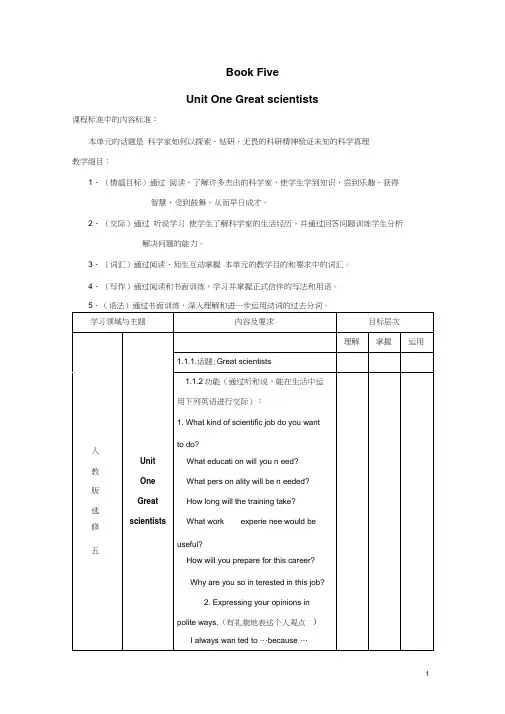
Book FiveUnit One Great scientists课程标准中的内容标准:本单元的话题是科学家如何以探索、钻研、无畏的科研精神验证未知的科学真理教学细目:1、(情感目标)通过阅读,了解许多杰出的科学家,使学生学到知识、尝到乐趣、获得智慧、受到鼓舞,从而早日成才。
2、(交际)通过听说学习使学生了解科学家的生活经历,并通过回答问题训练学生分析解决问题的能力。
3、(词汇)通过阅读、师生互动掌握本单元的教学目的和要求中的词汇。
4、(写作)通过阅读和书面训练,学习并掌握正式信件的写法和用语。
I.重点单词和词组P. 1Words: characteristics, pain ter, scie ntific, an alysePhrases: put forward, draw a con clusi onP.2Words: expert, attend, challenge, victim, absorb, suspect, enquiry, severe, pump, foresee, blame, pollute, han dlePhrases: expose to, be determ ined to, slow dow nP.3Words: announce, in structPhrases: link toP.4Words: con structi onPhrases: take in, come to an end , apart fromP.7Words: moveme nt, sen se, backward, spin, en thusiastic, cautious, reject, uni versePhrases: lead toII.重点句型见表1.1.7III.重点语法动词过去分词:理解和掌握过去分词做定语和表语的用法。
Part Two 单元目标检测I. 根据下列句子意思用所给词的正确形式或所给汉语/首字母填空(1X20=20'1. I turned the h _______ only to find the door was locked.2. It ' s almost impossible to ______ an ill ness uni ess the cause is exposed.3. No one could have ____________ (预料)that things would turn out this way.4. Call the doctor immediately if you s __________ you've been infected with diseases.5. I am very hungover (宿醉)after the night of drinking and my head is still _________ ( 旋转).6. He knew much about pictures and fine furniture, and was an __________ ( 热情的)gardener.7. Leaders of several countries _________ (出席)China ' WDay military parade on Sept 3 ,2015.8. There were times whe n the challe nges of writi ng such a huge novel almost _______ (打败)her.9. It seemed his body was ________ (排斥)a kidney he received in a transplant(移植)four yearsago.10. Gregor Men del used peas to show how physical ________________ ( 特点)are passed frompare nts to their childre n.11. Their school has been under _________________ (construct) for almost 5 years.12. It is reported that the doctor has made great _________ (contribute) in this field.13. He lay there without ____________ (move) staring into the sky.14. He stepped _____ (back) and fell off the cliff..15. The failure has made him lose his ________________ (enthusiastic) in reading16. Her husband is _________ (cautiously), never making a swift decision about anything..17. That she ___________ (rejection) his offer made him annoyed.18. The Earth is only one of the numerous planets in the _____ (universal).19. The thief seems _______________ (hide) in that cave. Let 'go and see.20. There are many people ___________ (absorb) in the public square dancing at the gate of thepark every ni ght.II.用所给词的词组适当形式填空(1X10=10'1. Can you make yourself clear ? I can ' _ ________________ (sense) what you mean.2. __________ (apart) the cost, we also n eed to thi nk about how much time the job will take.3. Stephen Hawking ____________ (put) his theory about black holes, which enjoyed worldfame.4. The saying “ All roads __ (lead) Rome" tells us different methods can produce the sameresult.5. From their small size to their funny voices, many of the Minion 小黄人)attributes©特点)have c ________________ (contribute) their popularity.6. There was an explosion happening the other day, for which the dust _____________________(blame).7. When we visited him, he ______________ (absorb) writ ing a no vel.8. From these facts we can ______________ (con clusi on) that he will quit the job.9. It is time to ________________ (announ ceme nt) for board ing the pla ne.10. She found it useless to _____________ (argue) him, so she decided to compromise with him.Ill .语法填空(2X10=20'阅读下面材料,在空白处填入适当内容(每空1个单词)或括号内单词的正确形式。
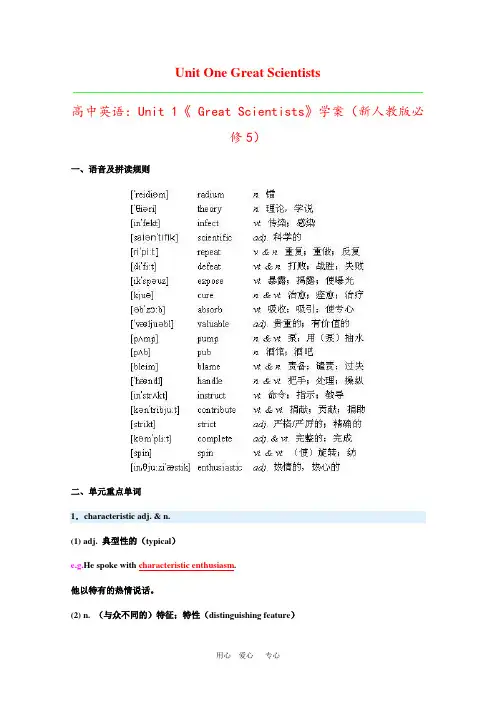
Unit One Great Scientists高中英语:Unit 1《 Great Scientists》学案(新人教版必修5)一、语音及拼读规则二、单元重点单词1.characteristic adj. & n.(1) adj. 典型性的(typical)e.g.He spoke with characteristic enthusiasm.他以特有的热情说话。
(2) n. (与众不同的)特征;特性(distinguishing feature)e.g.What characteristics distinguish the Americans from the Canadians?美国人和加拿大人的特征有什么不同?2.theory n. 学说;理论;意见;想法;设想e.g.Darwin’s theory of evolution达尔文的进化论He has a theory that wearing hats makes men go bald.他有个看法是男人戴帽子就会秃顶。
It sounds fine in theory, but will it work?道理是不错,但能否行得通?3.scientific adj. 科学的,用于科学研究的,关于科学的(of, used in or involved in science)e.g.They are very scientific in their approach.他们的方法很科学。
a scientific discovery, instrument, textbook, researcher科学发现、科学仪器、理科教科书、科学研究人员4.examine v. 仔细观察;检查;调查;审查(look at carefully in order to learn about or from.)e.g.The detective examined the window frame for fingerprints.侦探仔细查看窗框,寻找指纹。
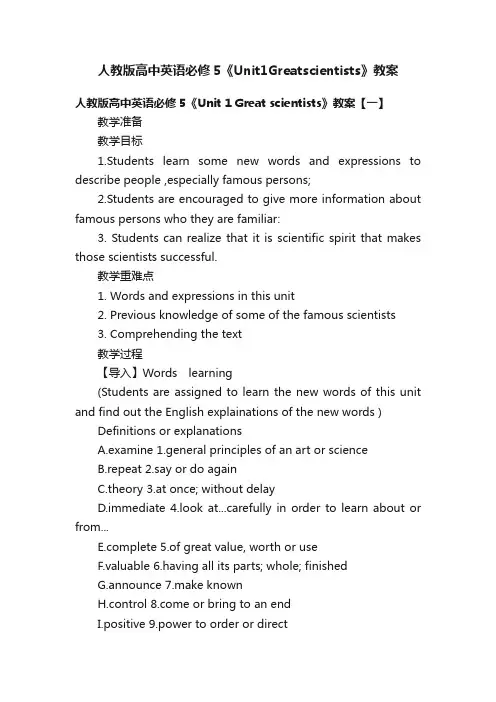
人教版高中英语必修5《Unit1Greatscientists》教案人教版高中英语必修5《Unit 1 Great scientists》教案【一】教学准备教学目标1.Students learn some new words and expressions to describe people ,especially famous persons;2.Students are encouraged to give more information about famous persons who they are familiar:3. Students can realize that it is scientific spirit that makes those scientists successful.教学重难点1. Words and expressions in this unit2. Previous knowledge of some of the famous scientists3. Comprehending the text教学过程【导入】Words learning(Students are assigned to learn the new words of this unit and find out the English explainations of the new words ) Definitions or explanationsA.examine 1.general principles of an art or scienceB.repeat 2.say or do againC.theory 3.at once; without delayD.immediate 4.look at...carefully in order to learn about or from...plete 5.of great value, worth or useF.valuable 6.having all its parts; whole; finishedG.announce 7.make knownH.control e or bring to an endI.positive 9.power to order or directJ.conclude 10.quite certain or sure【讲授】useful sentences learning(The sentences are picked from the text.)1.“All roads lead to Rome, ”he encouraged me after I failed the entrance examination.2.This sentence doesn’t make any sense.3.Our English teacher is not only strict with us but also friendly to us.4.He is good-looking, apart from his nose.5.It is announced that the spacecraft, Shenzhou Ⅵ, landed on the earth successfully.6.It is not Tom but you who are to blame.7.In 1995, the Chinese government put forward a plan for“rejuvenating the nation by relying on science and education”.And it has helped Chinese scientists make many breakthroughs.8.Have you drawn any conclusion after you read this passage?9.Well done.So much for the learning of the new words and expressions.【讲授】Introduction of a classic articleTeacher introduce a famous person --Qian Xuesen and students learn to write an article about the famous scientis using the words and expressions they just learn in class.【活动】Share the outcomeStudents share their article orally and discuss whether they have used some good and advanced expressions.【练习】Consolidation完成句子(1)爱因斯坦被认为是二十世纪最伟大的科学家之一。
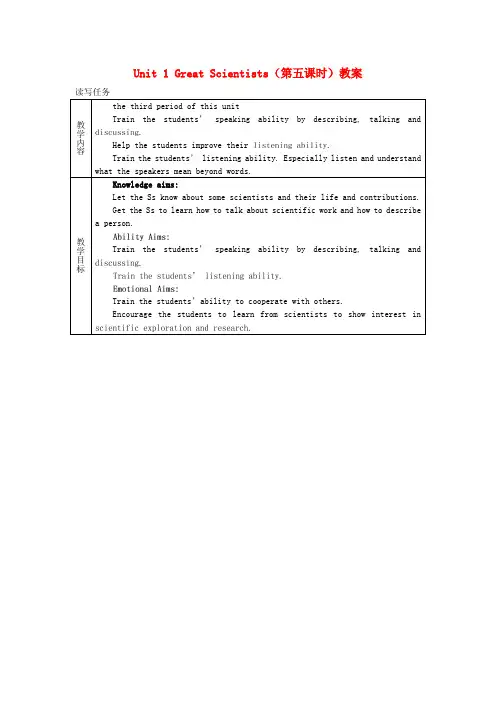
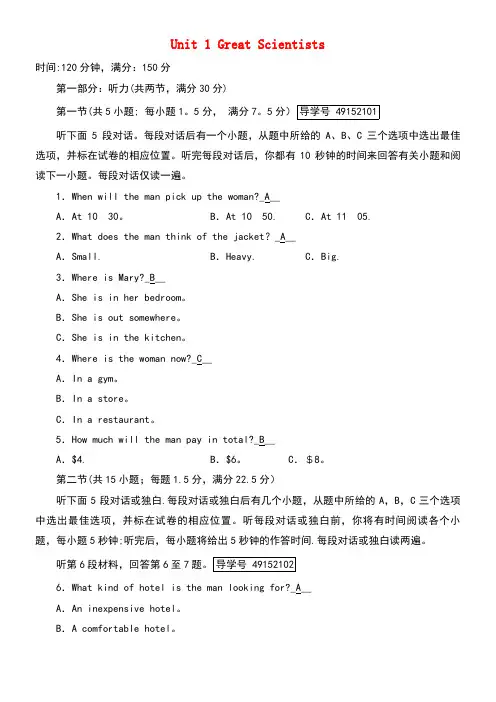
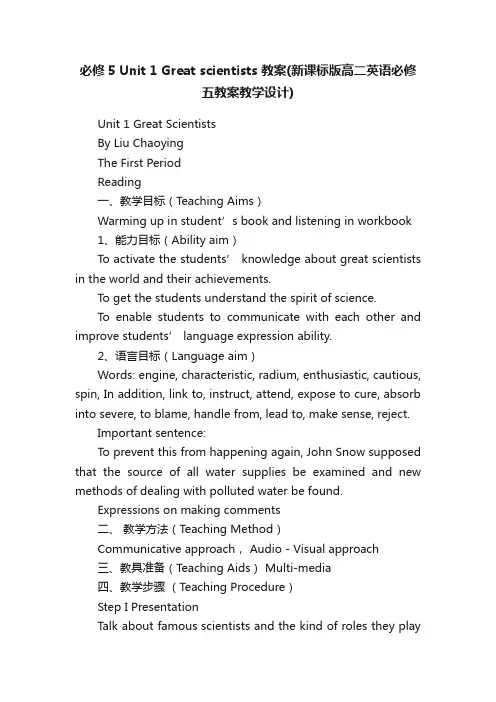
必修5 Unit 1 Great scientists 教案(新课标版高二英语必修五教案教学设计)Unit 1 Great ScientistsBy Liu ChaoyingThe First PeriodReading一、教学目标(T eaching Aims)Warming up in student’s book and listening in workbook1、能力目标(Ability aim)To activate the students’ knowledge about great scientists in the world and their achievements.To get the students understand the spirit of science.To enable students to communicate with each other and improve students’ langu age expression ability.2、语言目标(Language aim)Words: engine, characteristic, radium, enthusiastic, cautious, spin, In addition, link to, instruct, attend, expose to cure, absorb into severe, to blame, handle from, lead to, make sense, reject.Important sentence:To prevent this from happening again, John Snow supposed that the source of all water supplies be examined and new methods of dealing with polluted water be found.Expressions on making comments二、教学方法(Teaching Method)Communicative approach, Audio-Visual approach三、教具准备(T eaching Aids) Multi-media四、教学步骤(Teaching Procedure)Step I PresentationTalk about famous scientists and the kind of roles they playin history. Present a word match exercise to arouse the students’ interest on the topic.Step II TalkingTry a quiz and see who knows the most about scientists. Discuss in pairs about the significance of some achievements.Step III Group WorkDiscuss in groups about the basic factors that make a scientist successful.Homework1. Oral homework: Prepare a story about a famous scientist and share the story with the whole class.2. Written homework: Write down the story and make comments on the key to success.The Second PeriodExtensive Reading一、教学目标(Teaching Aims)Reading part in students’ book1、能力目标(Ability Aims)To train the students’ ability in skimming & scanning.To adapt the scientific spirit in their pursuit of knowledge.2、知识目标(Knowledge Aims)To lead the students to get some information on the steps ofa scientific research through reading.二、教学重难点(T eaching important points)a. Understand the spirit of science and scientists.b. Understand the details of each stage in examining a new scientific idea.c. Discuss what attitude the scientists should take towards a complete new finding that is against the present theory.三、教学方法(Teaching method)Communicative Approach, Task-based Approach四、教具准备(Teaching Aids) Multi-media五、教学步骤(Teaching Procedures)Step I Pre-readingAsk the students to get ready for reading by discussing about some infectious diseases and the ways of making a scientific research.Step II ReadingLet the students read through the whole passage and finish the required task.Help them to have a better understanding of the article by providing some background information and analysis.Step III Post-readingHold a discussion after reading in order to widen students’ views and further consolidate their knowledge on the topic.Homework: Finish the reading passage in the workbook.The Third PeriodLanguage Points一、教学目标(T eaching Aims)1. 能力目标(Ability aim)Students are required to learn how to guess the meaning of a new word according to the context and use the words and expressions in the first passage on Page 2.2. 语言目标(Language aim)Students are asked to learn about the words and expressions in the first passage on Page 2, including their meanings and the usage in our daily life.Key words expressions:a. attend, expose, cure, control, absorb, severe, valuable, pump, pub, blame, handle, link, in addition, announce, instruct(in Student’s Book)b. expose…to, test, defeat, reject, examine, apart from, contribute to, make a conclusion, make sense, enthusiastic, lead to, be strict with (in Workbook)二、教学重难点(Teaching important points)attend, expose, absorb, handle, in addition三、教学方法(T eaching Method): Explaining and practicing四、教具准备(T eaching Aids): Multi-media五、教学步骤(T eaching Procedure)Step I: Leading inAsk questions about the story of John Snow with the words and expressions presented.Step II Word StudyExplain the meanings of the words and phrases and learn how to use them.Step III Word ExercisesHomework:1. Go over the words and phrases students have learned and retell the story about John Snow’s defeating “King Cholera”.2. Choose the suitable words or expressions to complete the passage in the project:valuable, instruct, cure, expose, look into, examine, put forward, immediately, announceThe Fourth PeriodListening一、教学目标(Teaching goals)1.Target language目标语言重点词汇和短语astronomer, astronaut, institute, lily, specialist, sort out, produce, parrot, species, revise, foundation, symbol, analyse,pure, sin, cosin, geometry, calculus, mechanics, practical, topology.2.Ability goals 能力目标Get the students to know more about scientists and science by listening.3.Learning ability goals 学能目标Guide the students to get detailed ideas of listening materialsHelp the students to form good and correct listening habits.二、教学重难点 ( Important and difficult teaching points)a. Listen to materials and grasp the information neededb. The details of the listening materialsc. The new words of the listening materials.d. The unfamiliar subjects of the materials三、教学方法 (Teaching methods)Audio-lingual methodAudio-visual methodTask- based learning approach四、教具准备 (Teaching aide) Multi-media五、教学过程与方式 (Teaching procedures & ways)StepⅠlead-inTask 1: To develop the students predicative skill in listening. Ask students to describe the picture at page 5 and guess what details may be talked and mentioned in the listening.Listening (page 41)Task 1 Describe the picture and stimulate the student’s thinking.Task 2. Help the Ss to master the new words in the listening.species(种类),parrot(鹦鹉),blackbird(乌鸦),Task 3. Enable the students to get a general picture of thelistening and then extract specific information.Listening Task (Page 44)Task1. Introduce the students to the life and work of Leonhard Euler. Help students to gain some knowledge of topology.HomeworkAccording to the listening materials above, access the internet:to get further information.The Fifth PeriodGrammar and Writing一、目标语言(Target language)Using “make + n” and past participlesmake an appointment, make a gossip, make an apology, make a contest, make a choice, unexpected visitors, discouraged students, inspired contestant, crowded streets, struck speeches二、能力目标 (Ability goals Ability goals)Get the students to know how Past Participle used as attributive and predictive is used三、学能目标 (Learning ability goals)Guide the students to get detailed information for the writing四、教学重点 (Teaching important points)Past participle used as attributive and predicative.五、教学难点(Teaching difficult points)To teach students the right steps of writing a composition六、教学方法(Teaching methods)Discussing; task- based learning approach七、教具准备(Teaching aid) Multi-media八、教学过程与方式 (Teaching procedures & ways)Step I: assign the taskGregor Mendel's AchievementsStep II: thinkingNecessary steps in writing a compositionStep III: give an exampleHow to make a plan for your composition?How to draw an outline?HomeworkWrite a report about your scientist, his/her life, achievements and the key to his/her success.。
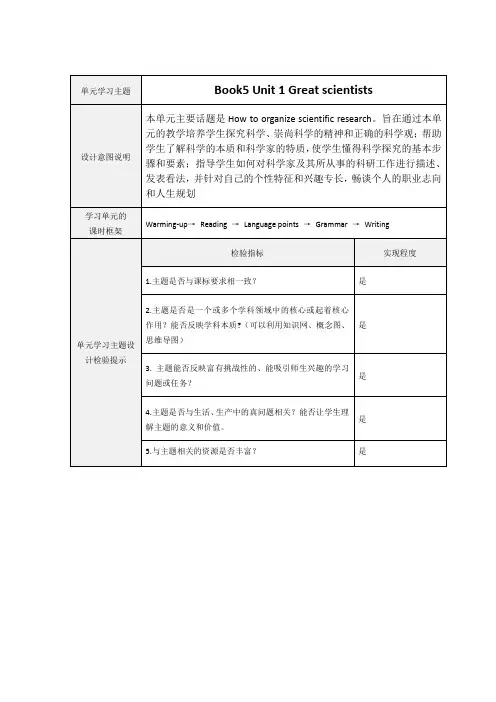
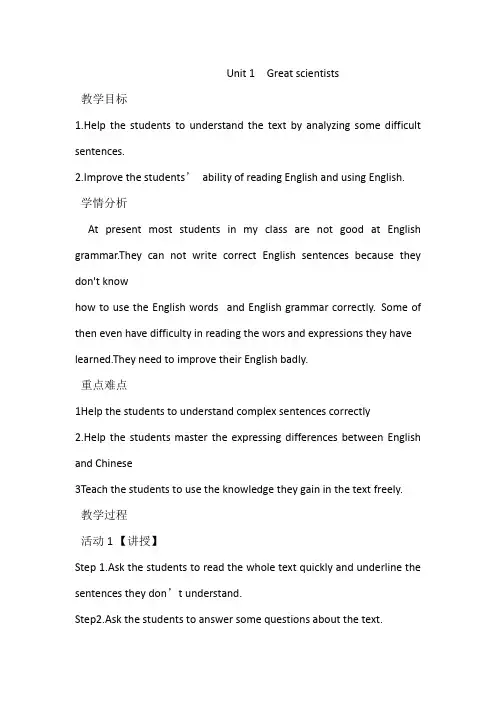
Unit 1Great scientists教学目标1.Help the students to understand the text by analyzing some difficult sentences.2.Improve the students’ability of reading English and using English.学情分析At present most students in my class are not good at English grammar.They can not write correct English sentences because they don't knowhow to use the English words and English grammar correctly. Some of then even have difficulty in reading the wors and expressions they have learned.They need to improve their English badly.重点难点1Help the students to understand complex sentences correctly2.Help the students master the expressing differences between English and Chinese3Teach the students to use the knowledge they gain in the text freely.教学过程活动1 【讲授】Step 1.Ask the students to read the whole text quickly and underline the sentences they don’t understand.Step2.Ask the students to answer some questions about the text.1.Why did John Snow attend Queen Victoria as her personal physician?2.Could cholera be cured when it hit London?3.What were the two theories that possibly explained how cholera killed people?4.What did John Snow suspect?5.Why was he determined to find out the cause of cholera?6.Why didn’t the people who worked in the pub at 7 Cambridge drink the water from the pump?7.How was the river polluted?8.What did John Snow tell the astonished people to do?9.Why did the woman and her husband die of cholera?10. What did John Snow suggest?Step 3.Ask the students to underline the sentences where the past participle is used.Step 4. Analyse some difficult sentences.But he became inspired when he thought about helping ordinary people exposed to cholera.So many thousands of terrified people died every time there was an outbreak.3.He knew that cholera would never be controlled until its cause was found.4.He became interested in two theories that possibly explained howcholera killed people.5.In two particular streets, the cholera outbreak was so severe that more than 500 people died in ten days.6.It seemed that the water was to blame.7. He found that it came from the river polluted by the dirty water from London.8.He immediately told the astonished people in Broad Street to remove the handle from the pump so that it could not be used.9.A woman, who had moved away from Broad Street, liked the water from the pump so much that she had it delivered to her house every day.10.To prevent this from happening again, John Snow suggested that the source of all the water supplies be examined.Step 5.Oral practiceSay a few words about John Snow in English.Homework :1.Read the text five times and recite the sentences where the past participle is used after class.Blackboard WorkJohn Snow Defeats “King Cholera”1. so----- that----由于---以至于----2. expose---- to----把---暴露在----3. be determined to do---决心干---4. be to blame ---应受惩罚5. have/ get----done 请某人干某事,某人遭受不幸6. prevent/stop sb (from) doing -----阻止---干----精美句子1、善思则能“从无字句处读书”。
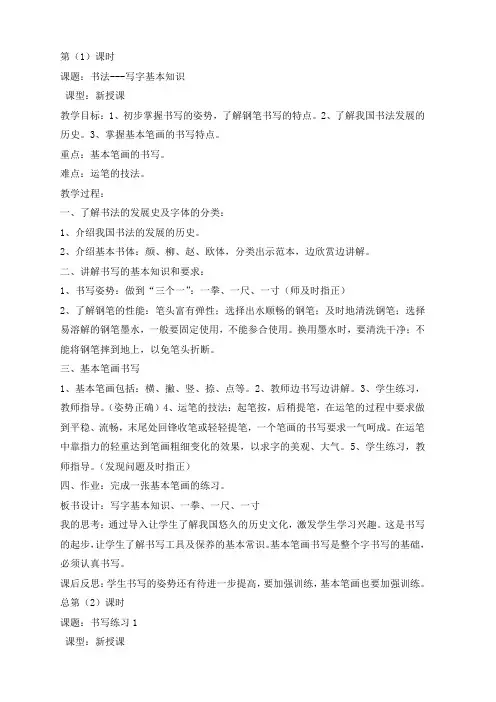
第(1)课时课题:书法---写字基本知识课型:新授课教学目标:1、初步掌握书写的姿势,了解钢笔书写的特点。
2、了解我国书法发展的历史。
3、掌握基本笔画的书写特点。
重点:基本笔画的书写。
难点:运笔的技法。
教学过程:一、了解书法的发展史及字体的分类:1、介绍我国书法的发展的历史。
2、介绍基本书体:颜、柳、赵、欧体,分类出示范本,边欣赏边讲解。
二、讲解书写的基本知识和要求:1、书写姿势:做到“三个一”:一拳、一尺、一寸(师及时指正)2、了解钢笔的性能:笔头富有弹性;选择出水顺畅的钢笔;及时地清洗钢笔;选择易溶解的钢笔墨水,一般要固定使用,不能参合使用。
换用墨水时,要清洗干净;不能将钢笔摔到地上,以免笔头折断。
三、基本笔画书写1、基本笔画包括:横、撇、竖、捺、点等。
2、教师边书写边讲解。
3、学生练习,教师指导。
(姿势正确)4、运笔的技法:起笔按,后稍提笔,在运笔的过程中要求做到平稳、流畅,末尾处回锋收笔或轻轻提笔,一个笔画的书写要求一气呵成。
在运笔中靠指力的轻重达到笔画粗细变化的效果,以求字的美观、大气。
5、学生练习,教师指导。
(发现问题及时指正)四、作业:完成一张基本笔画的练习。
板书设计:写字基本知识、一拳、一尺、一寸我的思考:通过导入让学生了解我国悠久的历史文化,激发学生学习兴趣。
这是书写的起步,让学生了解书写工具及保养的基本常识。
基本笔画书写是整个字书写的基础,必须认真书写。
课后反思:学生书写的姿势还有待进一步提高,要加强训练,基本笔画也要加强训练。
总第(2)课时课题:书写练习1课型:新授课教学目标:1、教会学生正确书写“杏花春雨江南”6个字。
2、使学生理解“杏花春雨江南”的意思,并用钢笔写出符合要求的的字。
重点:正确书写6个字。
难点:注意字的结构和笔画的书写。
教学过程:一、小结课堂内容,评价上次作业。
二、讲解新课:1、检查学生书写姿势和执笔动作(要求做到“三个一”)。
2、书写方法是:写一个字看一眼黑板。
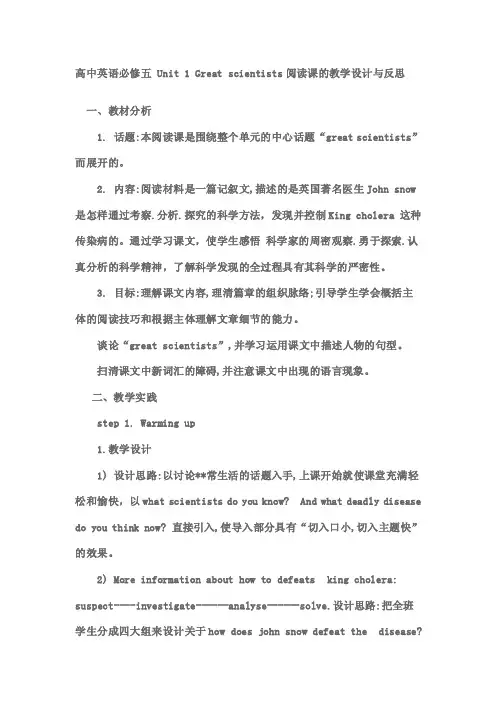
高中英语必修五 Unit 1 Great scientists阅读课的教学设计与反思一、教材分析1. 话题:本阅读课是围绕整个单元的中心话题“great scientists”而展开的。
2. 内容:阅读材料是一篇记叙文,描述的是英国著名医生John snow 是怎样通过考察.分析.探究的科学方法,发现并控制King cholera 这种传染病的。
通过学习课文,使学生感悟科学家的周密观察.勇于探索.认真分析的科学精神,了解科学发现的全过程具有其科学的严密性。
3. 目标:理解课文内容,理清篇章的组织脉络;引导学生学会概括主体的阅读技巧和根据主体理解文章细节的能力。
谈论“great scientists”,并学习运用课文中描述人物的句型。
扫清课文中新词汇的障碍,并注意课文中出现的语言现象。
二、教学实践step 1. Warming up1.教学设计1) 设计思路:以讨论**常生活的话题入手,上课开始就使课堂充满轻松和愉快,以what scientists do you know? And what deadly disease do you think now? 直接引入,使导入部分具有“切入口小,切入主题快”的效果。
2) More information about how to defeats king cholera: suspect----investigate------analyse------solve.设计思路:把全班学生分成四大组来设计关于how does john snow defeat the disease?的问题。
旨在学生之间设置“信息差”,有利于激发学生说的兴趣,在学生的相互交流中培养起发现问题和解决问题的能力。
3) Discussion: how did john snow finally prove it? And do you think he would have solved this problem without the map?设计思路:有趣的话题能极大的激发学生的好奇心,使其发挥丰富的想象力。
Unit 1 Great scientistsYuan Longping, a world-known Chinese agricultural expert , was born in Beijingin 1930.Whenhe was a child, he was very clever and absorbed all the knowledge well that the teachers could teach him. After graduation, he devoted himself to agricultural study.Once he often suspected the traditional planting methods and was determinedto increase rice harvest without increasing the area of fields.In the process ofhis study, he failed many times, but he never gave up. Apart from this, he often exposed himself to the rain and sunlight all day.At last he put forward many advanced theories and he announced to the world that he had succeeded in developing a newspecies that produced a 20 percent higher yields than common types of rice.He thought his life would be meaningful only if he could do something successfully.We can draw a conclusion that Yuan Longping is a great agricultural scientist.Owing to his great contribution to agriculture, he will always be remembered as “Father of Hybrid Rice ”.袁隆平是世界有名的中国农业专家,他于 1930 年出生在北京。
人教版Module 5 Unit 1 Great scientists单元回归—评价单课题:Revision基础训练I 重点单词:(每个1分,共20分)1. _____________ n. 特征;特性2. _____________ n. 画家;油漆匠3. _____________ adj. 科学的4. _____________vt. & vi. 结束;推断出5. _____________ n. 结论;结束6. _____________vt. 分析7. _____________ vt. 打败;战胜8. _____________ adj. 熟练地n. 专家9. _____________ vt. 照顾;护理10. ____________ n. 医生;内科医师11. ____________ vt. 暴露;揭露12. ____________ n. &vt. 治愈13. ____________ n. 挑战vt.向...挑战14. ____________ n. 受害者15. ____________ vt. 吸收;吸引16. ____________ vt. 怀疑n. 嫌疑犯17. ____________ n. 询问18. ____________ n. 附近;邻近19. ____________ adj. 严重的;剧烈的20. ____________ n. 线索;提示II. 重点短语:(每个1分,共20分)1. 提出___________________2. 得出结论________________3. 使暴露_________________4. 除...之外;此外________________5. 对...严格的______________6. 讲得通;有意义________________7. 将…和…联系起来__________ 8. 最后,总之___________________9. 专注;聚精会神___________________10. 从…中推断出________________11. 治愈…(病)_________________ 12. 失去控制________________13. 责备某人做某事______________ 14. 把某事归咎于某人__________15. 应受责备_____________ 16. 理解;懂___________________17. 没有道理;没有意义_____________ 18. 绝不___________________19. 从某种意义上讲_________________ 20. 做某事没有意义_______________Ⅰ.用括号内所给单词的适当形式填空1.Yesterday I missed ________(attend) the meeting in Room 101.2.Scientists found that people ________(expose) to high levels of pollutants(污染物) were up to 5% more likely to suffer a heart attack.3.I am sure the pure girl's wound will ________(cure).4.________(blame) for the breakdown of the school computer network,Alice was in low spirits.5.He has made great ________(contribute) to the world peace.6.What ________(conclude) can you draw from the discussion?7.________(absorb) in his writing,the writer forgot to flick the ashes from his cigar. 8.They have got five victories and two ________(defeat).9.The news ________(announce) to the public on TV.10.She arrived at 10 o'clock as ________(instruct).Ⅱ.短语填空2.All the people present accepted the suggestion____________by the chairman. 3.Generally speaking,parents like the teachers who______________their children. 4.The coal mine explosion in Northeastern China______________the public by the media. 5.There are three spelling mistakes in this sentence,so it doesn't______________.6.We can't______________without having a wide investigation into this matter.Ⅲ.完成句子1.If anyone ________________,it's me.如果有人该承担责任,那就是我。
Unit 1 Great scientists【学习目标】掌握本单元的常用词汇表达。
【学习重难点】熟练记住常用词汇与词组。
【学习方法】速读、细读、归纳、练习【学习内容】一、重点词汇1. argue v. 的用法▲构词:argument n. 1. [C]争论 2. [U]讨论、辩论 3.[C]论据▲搭配:①argue with / against sb. over / on / about sth. 与某人争论某事②argue for / against sth. 辩论赞成/反对某事③argue that... 主张,认为,争辩说④argue sb into / out of doing sth. 说服某人做/不做某事▲友情提示:"说服某人做/不做某事"还可表达为:talk / persuade / reason sb. into / out of doing sth.⑤settle the argument 解决争端▲友情提示:an argument with sb about / over sth. 为某事和某人而发生的争执【考例】What laughing ____ we had about the socially respectable method for moving spaghetti (意大利式细面条) from plate to mouth.A. speechesB. lessonsC. sayingsD. arguments[考查目标]argue名词形式的词义。
[答案与解析] D argument的词义是"争辩,辩论"。
2. compare v. 的用法▲构词:comparison n. 比较▲搭配:①compare...to... 比拟;比作②compare... with / to... 将……和……相比较③compare notes 对笔记;交换意见【考例】____ with the size of the whole earth, the biggest ocean does not seem big at all. (2004湖北)A. CompareB. When comparingC. ComparingD. When compared[考查目标]compare的用法。
新修必修5 Unit 1 Great scientists导学单2目录•一、课前导学•二、课中探究•三、课后拓展•四、习题训练•五、思考题一、课前导学在本单元中,我们将学习有关伟大科学家的知识,他们对人类的贡献以及他们在科学领域的突破性发现。
本导学单将帮助你在课前对本单元要学习的内容进行预习。
首先,请你思考以下问题:1.你能想到几位伟大的科学家?他们分别取得了什么成就?2.这些科学家对你个人的生活有什么影响?3.你对科学的认识有哪些?二、课中探究本单元我们将学习两位伟大的科学家,分别是牛顿和达尔文。
他们分别在物理学和生物学领域取得了重要的突破性发现。
在课堂上,老师会向我们介绍他们的生平和贡献,同时还会引导我们进行相关实验和探究。
在课中,我们要做到以下几点:1.认真聆听老师的讲解,了解牛顿和达尔文的生平和贡献。
2.积极参与实验和探究活动,亲自体验科学的乐趣。
3.和同学们一起讨论和交流,分享彼此的想法和观点。
三、课后拓展课后,你可以进一步拓展你对牛顿和达尔文的了解。
你可以使用图书馆或互联网资源查找相关资料,并回答以下问题:1.牛顿的三大定律分别是什么?能否举例说明?2.达尔文提出的进化论主张了什么?有哪些证据支持进化论?3.你认为牛顿和达尔文的贡献对人类的发展有何影响?你可以将你的研究成果写成一篇小论文,并与同学们分享。
四、习题训练1.牛顿第一定律也被称为惯性定律,请问以下哪种情况符合牛顿第一定律的描述?A. 一个静止的物体会一直保持静止状态。
B. 一个物体受到作用力时会产生加速度。
C. 一个匀速直线运动的物体不受力时会一直直线运动。
D. 一个物体在运动时会保持速度不变。
2.达尔文提出的进化论认为,物种会经历自然选择,根据适者生存的原则,适应环境的个体更有可能生存和繁殖。
请问以下哪种情况体现了自然选择的原则?A. 鹿角逐领导地位时只有最强壮的雄鹿能赢得领地。
B. 企鹅在南极洲的寒冷环境下进化出了厚厚的羽毛。